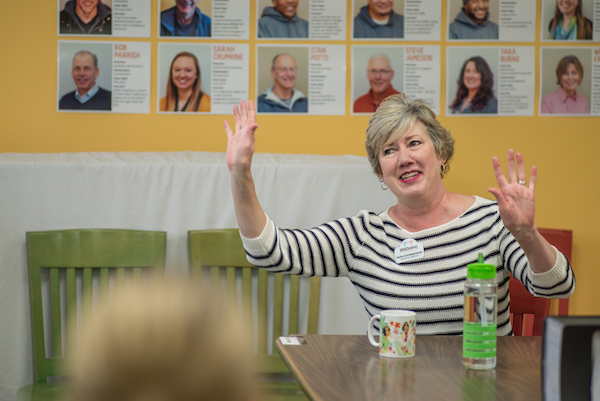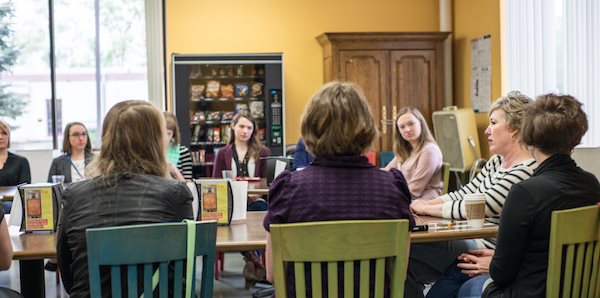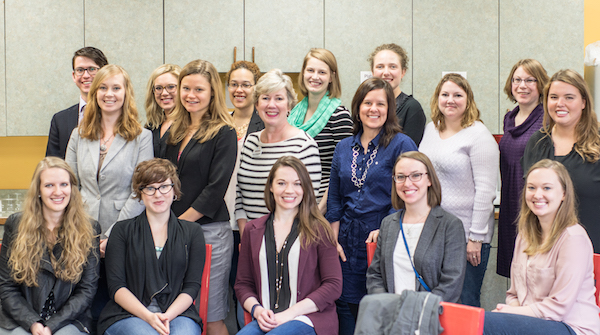
Words by Lisa Dahlberg // Photos by Marie Ketring
It’s 7:00 a.m. and Sara Sternberger is already busy setting out breakfast and chatting with the bleary-eyed young professionals gathered for the YNPN and Pollen leadership breakfast at Bridging’s headquarters. When the executive director hears there’s going to be a photo, she rolls her eyes and says, “Oh, great.” The group laughs.
Although Sara hails from Michigan, you won’t find a trace of wide-eyed Midwestern guilelessness in her. Sara’s wit is quick and sharp; her honesty so jarring at times you wonder if you’re hearing her right. But after two Master’s degrees, a pivot from the healthcare industry to the nonprofit sector, and leadership roles in many well-known nonprofits in the Twin Cities, Sara knows herself and her work. Even when facing tough situations, she has an unapologetic confidence in her choices. Her most recent decision? To move on from Bridging and step into a new role as the executive director of Free Arts Minnesota.
“I’m really good at the growing — the turnaround and taking organizations to the next level. I’m not a good lifer. Most of my jobs have been five to seven years. That’s about the maximum I make it in any job because I’m like, ‘Time to move on to the next challenge!’”
Here’s her advice for young nonprofit professionals just starting out in their careers.
Five Things To Know From a Tell-It-Like-It-Is Executive Director
There is life after kids.
At the beginning of my career with little kids, life was crazy. But I never felt like I wasn’t doing what I wanted to be doing. I do a lot of volunteer work on top of everything else. I think when you start your kids with that lifestyle, they never know any different. My kids have always known that I volunteer and that I’m gone certain evenings. You can do it all; you just can’t do it all at once. Although I will say this: If you let your kids think they’re the center of the world, you will constantly feel guilty and stressed out about everything. If you feel like you have to be at every single event and every single game, and you have times when you can’t make it, you’re going to live with guilt and shame. You shouldn’t have to feel guilt and shame as a parent. You have a life. You need an adult life along with giving your kids a good life.
Transparency is key.
When I started at Bridging, the organization was more than $300,000 in debt. We took out a mortgage on our warehouse to pay bills and we owed people money for like three years. It was pretty bad. We had donors who said to us, “We love what you’re doing, but basically — get your shit together. This is the last check we’re going to write you until you get things straightened out.” It was totally appropriate for them to be doing that, given the circumstances. The first step to turning things around was to make sure everyone on staff knew I was accessible. I met with each staff member one-on-one. It’s amazing as a new person what you can find out. I always ask, “Is there anything you think I should know?” I’m a big believer in transparency, so I let our staff, management, and volunteers know we needed to pull together in order to get out of this hole. Some people were shocked and had no idea things had gotten so bad. Building trust really started with communication. I’m always around, working, and talking with volunteers and staff; visibility helped build that trust. We came through it and went from being a $1.5 million organization to a $2.7 million organization, which is about thirty percent growth in five years.
People aren’t always going to love you.
When I started at Bridging, we did a reorganization and I had to eliminate three positions. Unlike some jobs, I’ve got 600 individual active volunteers. I’ve got this huge peanut gallery that feels they can weigh in on everything. I was getting anonymous letters from volunteers like, “I can’t believe that you…blah blah blah.” And I was just like, “Well, if you’re not going to tell me who you are, the letter goes in the garbage. I’d be happy to talk to you about it if you just tell me who you are.” But you know, we only lost three volunteers out of about 600. We’re stewards of the resources and money we get. We serve clients, so that has to be at the top of what we do. So just know that as long as you’re doing what’s best for the organization, you can take the heat — even if it isn’t the most pleasant thing.
If you don’t count sleeping, you spend more time with the people you work with than anyone else. So you better like what you do.
My philosophy when it comes to firing people is to try to get people to realize that it’s time for them to leave — mentoring people out. I typically have people come back and say to me, “I’m really glad I finally got that you were telling me this was not a good fit for me.” Usually they go on to much better positions. Often, it’s an issue of fit. It’s not saying you’re not smart, or you’re not capable; it’s just not the right job for you.
Nobody takes a vow of poverty when they go to work at a nonprofit.
When we were doing our reorganization, one of my big goals was to get our warehouse and delivery staff to a livable wage, which for us was $15 per hour. I wanted to make sure that our warehouse and delivery people knew that if they stayed here with us and performed well that they’d have the ability to hit $15 per hour or more. I knew I had some people on staff who were kind of living paycheck to paycheck. And they’re choosing to work at Bridging because they believe in what they do. They’re serving clients. I didn’t want my staff at the lower end of the pay scale to feel that kind of pressure. I always tell my team, none of us took a vow of poverty when we joined a nonprofit. And I’ll tell you what, the thing that blows my mind — if Bridging can pay people $15 per hour, everybody can do it. I mean, we’re a friggin’ nonprofit; cut me a break.
This piece is a summary of a conversation with Sara Sternberger, which took place at Bridging on May 8, 2015, as part of Pollen and YNPN-TC’s joint Breakfast of Champions series. For more information, or to register for an upcoming event, check ynpntwincities.org.













